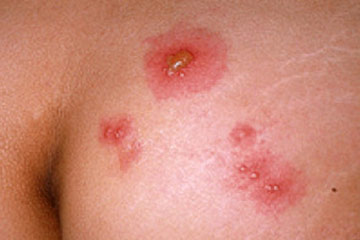Technical Instructions For Syphilis For Civil Surgeons
CDC Immigration Requirements: Technical Instructions For Syphilis For Civil Surgeons
Preface
The medical screening for syphilis among persons applying for adjustment of status to permanent resident and other persons required by law to have a medical examination, hereafter referred to as applicants, is an essential component of the immigration-related medical evaluation. Because syphilis may be challenging to diagnose and treat, these instructions provide a method for recording findings from the medical examination and additional guidance for the civil surgeon in classifying applicants.
The instructions in this document supersede all previous Technical Instructions, Updates to the Technical Instructions, memoranda and letters to panel physicians, and memoranda and letters to international refugee resettlement organizations. These instructions are to be followed for syphilis screening and treatment among all applicants and are effective as of January 1, 2013.
Visit the Technical Instructions for Civil Surgeons webpage for more information about the medical examination for applicants for U.S. immigration.
Key Concepts
All applicants 15 years of age or older must be tested for evidence of syphilis.
Applicants under the age of 15 must be tested if there is reason to suspect infection with syphilis or if there is a history of syphilis.
Syphilis Screening
Syphilis is a sexually transmitted, systemic disease caused by Treponema pallidum. It has often been called “the great imitator” because of its wide variety of signs and symptoms, with different stages having different clinical manifestations. There are three infectious stages (primary, secondary, and early latent disease) and two noninfectious stages (late latent and tertiary disease). Untreated syphilis can progress and lead to long-term sequelae and death.
Medical History
Obtaining the medical history should include inquiring about any history of painless sores on the genitals, anus, or mouth or a rash on the body, especially on the palms or soles of the feet.
Physical Examination
The physical examination should include an evaluation for any genital, anal, perianal or mouth sores (chancres) or rashes on the body, particularly on the palms of the hands or soles of the feet, that would indicate a syphilis infection. Sores consistent with syphilis are typically small, painless, indurated, clean-based ulcers. Regional lymphadenopathy may be present in primary or secondary syphilis. Applicants should be evaluated for clinical signs of neurosyphilis (i.e., cranial nerve dysfunction, meningitis, stroke, acute or chronic altered mental status, loss of vibration sense, and auditory or ophthalmic abnormalities). Syphilis in children (either congenital or acquired) must be properly evaluated. Physical examination findings in congenital syphilis may include nonimmune hydrops, jaundice, hepatosplenomegaly, rhinitis, skin rash, and pseudoparalysis of an extremity. In older children, signs of untreated congenital infection may include: interstitial keratitis (5–20 years of age), eighth cranial nerve deafness (10–40 years of age), Hutchinson teeth (peg-shaped, notched central incisors), anterior bowing of the shins, frontal bossing, mulberry molars, saddle nose, rhagades (linear scars around the mouth), and Clutton joints (symmetric, painless swelling of the knees).
Laboratory Testing
A nontreponemal test (e.g., Venereal Disease Research Laboratory [VDRL] or rapid plasma reagin [RPR] or equivalent test) should first be used for screening. Positive results on screening tests should then be confirmed using a treponemal test (e.g., the T. pallidum passive particle agglutination [TP-PA] assay, theT. pallidum microhaemagglutination assay [MHA-TP], enzyme immunoassays (EIAs), or chemiluminescence immunoassays (CIAs)). Testing must be performed in this order. If the confirmatory test is positive, nontreponemal serum titers should be performed and documented on the Medical Examination for Immigrant or Refugee Applicant Form (I-693). Syphilis tests must be performed at the time of the screening medical examination and at the civil surgeon’s designated laboratory. Tests performed elsewhere or prior to the civil surgeon’s examination of the applicant are not acceptable. Applicants with clinical signs of neurosyphilis should have a cerebral spinal fluid (CSF) analysis for VDRL, cell count, and protein. Applicants with evidence of auditory or ophthalmic abnormalities should additionally have otologic and ocular slit-lamp ophthalmologic examinations performed, respectively. Children with suspected syphilis infection should have a nontreponemal test performed, followed by a confirmatory treponemal test if positive. Older infants and children aged ≥1 month who are identified as having reactive serologic tests for syphilis should have maternal serology and records reviewed to assess whether they have congenital or acquired syphilis. Any child at risk for congenital syphilis should receive a full evaluation which may include CSF analysis, complete blood count and differential, and long-bone radiographs, depending upon previous documented evaluation. Darkfield microscopic examination of suspicious lesions or body fluids (e.g., nasal discharge) also should be performed. Civil surgeons should refer to CDC’s Sexually Transmitted Diseases (STD) Treatment Guidelines for specific guidance on testing in children.
All applicants diagnosed with confirmed syphilis should also be advised to be tested for HIV. The consent for HIV testing should include the following:
- Applicants understand they do not have to be tested for HIV.
- Applicants understand that if they would like to be tested for HIV, they do not have to be tested for HIV by a civil surgeon.
- Applicants understand that civil surgeons must include the test results on the paperwork they complete.
If the applicant consents, civil surgeons should perform HIV testing.
Syphilis Screening Results
Applicants with untreated syphilis are considered to be Class A.
After completing treatment, they are re-classified as Class B.
The evaluation is complete when the required aspects of the medical examination have been completed and the applicant can be assigned a syphilis classification.
It is important that syphilis be correctly diagnosed among applicants for adjustment of status. Correct diagnosis of syphilis will ensure that affected applicants receive appropriate treatment, that long-term sequelae are minimized, and will reduce further spread of the disease.
The applicant must be treated using a standard treatment regimen (see Syphilis Treatment) before the medical report form is completed. All test results and treatment information, including medication, dose, and date(s) of treatment, must be recorded on the I-693 form.
Once the recommended treatment is completed, syphilis is no longer a Class A condition. After treatment, syphilis is a class B condition (whether with or without residual defect) and should be recorded as such on the I-693 form.
Syphilis Treatment
Treatment of syphilis should follow U.S. guidelines.
- Details of treatment must be provided in Part 1 of the I-693 form
- No proven alternatives to penicillin are available for treating neurosyphilis, congenital syphilis or syphilis in pregnant women. Therefore, infected applicants with neurosyphilis, who are children, or pregnant should be desensitized and treated with penicillin if appropriate facilities are available.
- Adult applicants treated for syphilis should be informed by civil surgeons that they will need follow-up care for clinical and serologic re-evaluation in 6 months (3 months if HIV positive and treated for primary or secondary syphilis). Children should receive follow-up care 2-3 months after treatment. This follow-up does not affect the examination validity period.
Documentation
All medical documentation, including any laboratory reports,must be included with the required I-693 forms.
For applicants requiring syphilis treatment after arrival in the United States, the civil surgeon is required to document the following:
- Stage of syphilis based on history and clinical findings
- Drug regimen received (including doses, dosage units, and administration routes of all medications), start date, completion date, and any periods of interruption.
- Clinical course such as clinical improvement or lack of improvement during and after treatment for primary or secondary syphilis, including resolution of symptoms and signs, and any drug reactions.
The original Report of Medical Examination and Vaccination Record, must be completed in entirety, signed, and placed in a sealed envelope for submission to the Department of Homeland Security (DHS), Citizenship and Immigration Services (USCIS) office. This includes assigning a classification on the I-693 if an applicant is Class A or Class B for syphilis.
Glossary of Abbreviations
| Acronym | Full Phrase |
|---|---|
| CDC | Centers for Disease Control and Prevention, United States |
| CIA | Chemiluminescence immunoassay |
| CSF | Cerebral spinal fluid |
| DGMQ | Division of Global Migration and Quarantine |
| DHS | Department of Homeland Security |
| DOS | Department of State |
| EIA | Enzyme immunoassay |
| FTA-ABS | Fluorescent treponemal antibody absorbed |
| HIV | Human immunodeficiency virus |
| MHA-TP | T. pallidum microhaemagglutination assay |
| RPR | Rapid plasma reagin |
| STD | Sexually transmitted disease |
| TP-PA | T. pallidum passive particle agglutination assay |
| USCIS | United States Citizenship and Immigration Services |
| VDRL | Venereal Disease Research Laboratory |
- Page last reviewed: December 17, 2012
- Page last updated: December 17, 2012
- Content source: Centers for Disease Control and Prevention
National Center for Emerging and Zoonotic Infectious Diseases (NCEZID)
Division of Global Migration and Quarantine (DGMQ)
Source
CDC Immigration Requirements: Technical Instructions For Syphilis For Civil Surgeons
Centers for Disease Control and Prevention
GeoSalud, March 29, 2013






